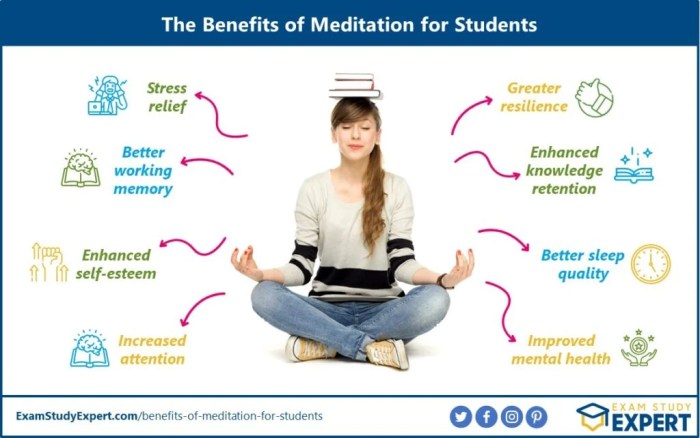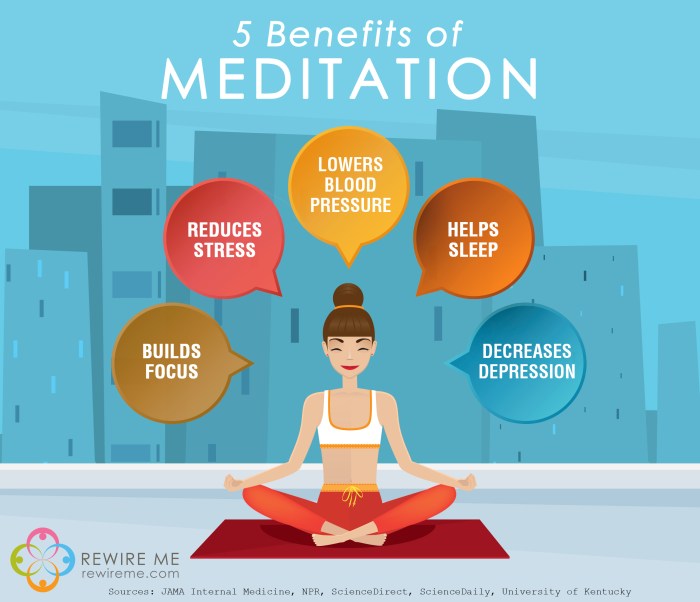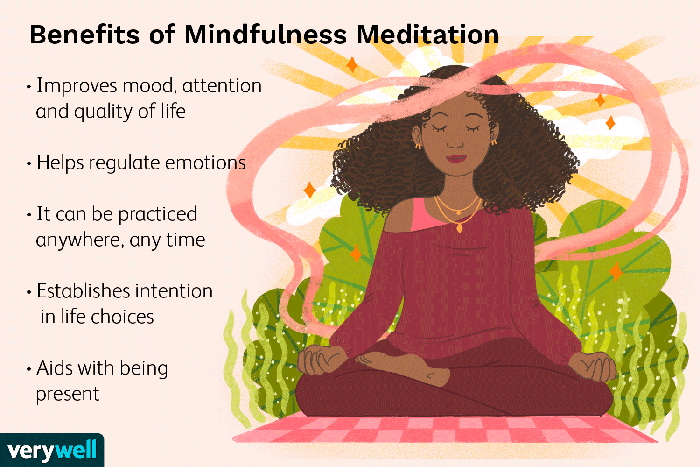Delving into 14 Positive Impacts of Mindfulness Meditation, this introduction immerses readers in a unique and compelling narrative, with a focus on how mindfulness meditation can bring about positive changes in various aspects of life. From mental health to creativity, this exploration will shed light on the transformative power of mindfulness practice.
As we journey through each impact, you will discover the profound benefits that mindfulness meditation can offer, ultimately leading to a more balanced and fulfilling life.
Positive Impact on Mental Health
Mindfulness meditation has been shown to have a positive impact on mental health by promoting emotional regulation, reducing stress, and enhancing overall well-being. This practice encourages individuals to be present in the moment, acknowledge their thoughts and feelings without judgment, and cultivate a sense of inner peace and calm.
Reduction in Anxiety and Depression Symptoms
- Mindfulness meditation has been linked to a decrease in symptoms of anxiety and depression, providing individuals with effective coping mechanisms to manage these mental health conditions.
- Research studies have demonstrated that regular mindfulness practice can lead to significant improvements in mood and a reduction in overall psychological distress.
Enhanced Cognitive Functioning
- Engaging in mindfulness meditation has been associated with improvements in cognitive function, such as increased focus, attention, and memory retention.
- Individuals who practice mindfulness regularly often report better decision-making skills and problem-solving abilities, leading to a more positive mindset and outlook on life.
Stress Reduction and Emotional Regulation
- By learning to focus on the present moment and observe their thoughts without attachment, individuals can better manage stress and regulate their emotions effectively.
- Mindfulness meditation helps individuals develop a non-reactive awareness of their thoughts and feelings, allowing them to respond to challenging situations with greater resilience and composure.
Reduction of Stress and Anxiety
Mindfulness meditation has been proven to be highly effective in reducing stress and anxiety levels. By focusing on the present moment and acknowledging thoughts without judgment, individuals can better manage their stressors and anxieties.
Mindfulness Meditation vs. Other Stress-Relief Techniques
- Mindfulness meditation targets the root cause of stress and anxiety by addressing the way individuals perceive and react to their thoughts and emotions, leading to long-lasting effects.
- Unlike some stress-relief techniques that offer temporary relief, mindfulness meditation provides individuals with the tools to cope with stress and anxiety in a sustainable way.
- Other techniques like medication or alcohol may provide immediate relief, but they do not address the underlying issues contributing to stress and anxiety.
Personal Experiences with Stress and Anxiety Reduction through Mindfulness Meditation
- After incorporating mindfulness meditation into my daily routine, I noticed a significant decrease in my stress levels and a greater sense of calmness and clarity.
- Through regular practice, I have learned to let go of worrying thoughts and focus on the present moment, which has helped me manage my anxiety effectively.
- Many individuals have shared success stories of overcoming chronic stress and anxiety through mindfulness meditation, highlighting its transformative impact on mental well-being.
Enhancing Emotional Well-being
Mindfulness meditation is a powerful tool that can greatly enhance emotional well-being by helping individuals become more aware of their emotions, thoughts, and reactions. This increased self-awareness allows for better emotional regulation and management, leading to improved overall emotional health.
Specific Emotions Influenced by Mindfulness Meditation
- Mindfulness meditation can positively influence feelings of anxiety and depression by promoting a sense of calm and reducing negative thought patterns.
- It can help individuals manage anger and frustration more effectively by creating space between the emotion and the reaction, allowing for a more thoughtful response.
- Practicing mindfulness can enhance feelings of gratitude and compassion, leading to a greater sense of connection with others and increased empathy.
Plan for Improving Emotional Health with Mindfulness Meditation
Creating a plan to improve emotional health through mindfulness meditation involves establishing a regular practice and incorporating mindfulness techniques into daily routines. Here are some steps to consider:
- Set aside dedicated time each day for mindfulness meditation, even if it’s just a few minutes in the morning or evening.
- Practice deep breathing exercises to bring awareness to the present moment and calm the mind.
- Use mindfulness techniques such as body scans or loving-kindness meditation to cultivate positive emotions and reduce stress.
- Attend mindfulness meditation classes or workshops to deepen your practice and connect with a supportive community.
Improving Focus and Concentration

Mindfulness meditation can significantly enhance focus and concentration by training the mind to stay present and in the moment. This practice helps individuals become more aware of distractions and gently bring their attention back to the task at hand, ultimately improving cognitive function.
Ways Mindfulness Meditation Improves Focus:, 14 Positive Impacts of Mindfulness Meditation
- Reduces mind-wandering: Mindfulness meditation teaches individuals to acknowledge wandering thoughts without judgment and refocus on the present moment, reducing distractions.
- Enhances attention span: Regular practice of mindfulness meditation can increase the ability to sustain attention on a specific object or task for longer periods.
- Improves cognitive control: By practicing mindfulness, individuals can strengthen their ability to regulate emotions and impulses, leading to better focus and decision-making.
Tips to Enhance Focus through Mindfulness Practices:
- Start with short sessions: Begin with brief mindfulness meditation sessions and gradually increase the duration as you build your focus and concentration.
- Focus on the breath: Use the breath as an anchor to bring your attention back whenever it wanders, cultivating a sense of presence and focus.
- Practice consistently: Establish a regular mindfulness practice to train your mind to be more attentive and focused in your daily activities.
Scientific Evidence Supporting Improvements in Focus and Concentration:
Research studies have shown that mindfulness meditation can lead to structural changes in the brain, specifically in areas related to attention, focus, and cognitive function.
A study published in the journal Psychological Science found that participants who engaged in mindfulness meditation showed improved focus and working memory capacity compared to those who did not practice meditation.
Boosting Self-Awareness
Mindfulness meditation is a powerful tool that can significantly boost self-awareness. By practicing mindfulness, individuals learn to observe their thoughts, emotions, and sensations without judgment. This non-judgmental awareness allows individuals to gain a deeper understanding of themselves and their patterns of behavior.
Techniques for Promoting Self-Awareness
- Body Scan Meditation: This technique involves focusing on different parts of the body, noticing any sensations or tensions present. This helps individuals become more aware of physical sensations and how they are interconnected with emotions.
- Observing Thoughts: Mindfulness meditation encourages individuals to observe their thoughts as they arise without getting caught up in them. This practice helps in recognizing thought patterns and understanding the impact of thoughts on emotions.
- Emotional Awareness: By paying attention to emotions as they arise during meditation, individuals can develop a deeper understanding of their emotional responses. This leads to better emotional regulation and self-control in daily life.
Benefits of Increased Self-Awareness
- Improved Decision-Making: Self-awareness allows individuals to make decisions that are in alignment with their values and goals, leading to better outcomes.
- Enhanced Relationships: Understanding oneself better through mindfulness meditation can lead to improved communication and empathy in relationships, as individuals can express their needs and boundaries effectively.
- Stress Reduction: Increased self-awareness helps individuals recognize stress triggers and implement coping strategies effectively, leading to a reduction in overall stress levels.
Strengthening Relationships: 14 Positive Impacts Of Mindfulness Meditation
Mindfulness meditation can play a significant role in strengthening relationships with others by promoting better communication, empathy, and understanding. When individuals practice mindfulness, they become more present in their interactions, leading to deeper connections with their loved ones.
Improved Communication
- By being fully present and attentive during conversations, individuals practicing mindfulness can actively listen to others without distractions.
- Increased awareness of their own thoughts and emotions helps individuals communicate more effectively and express themselves clearly.
- Mindfulness allows individuals to respond thoughtfully rather than react impulsively, leading to more constructive dialogues in relationships.
Enhanced Empathy
- Practicing mindfulness cultivates empathy by encouraging individuals to consider the perspectives and feelings of others.
- Being more attuned to their own emotions helps individuals better understand the emotions of their partners, friends, or family members.
- Empathy nurtured through mindfulness meditation fosters compassion and kindness in relationships, strengthening the emotional bond between individuals.
Tips for Incorporating Mindfulness into Relationships
- Practice mindfulness together with your partner or loved ones, such as engaging in mindful breathing exercises or meditation sessions as a shared activity.
- Use mindfulness techniques during conflicts or disagreements to stay calm, listen actively, and respond with empathy rather than defensiveness.
- Show appreciation and gratitude towards your loved ones through mindful gestures, such as expressing heartfelt compliments or acts of kindness.
Cultivating Gratitude

Mindfulness meditation plays a significant role in cultivating gratitude by helping individuals become more present and aware of the positive aspects of their lives. This practice allows people to focus on the present moment and appreciate the beauty and blessings that surround them.
Increased Awareness of Blessings
- Through mindfulness meditation, individuals learn to pay attention to the small moments of joy and blessings in their daily lives.
- This increased awareness helps in cultivating gratitude by shifting the focus from what is lacking to what is already present and valuable.
- By acknowledging and appreciating these blessings, individuals develop a sense of gratitude that enhances their overall well-being.
Positive Impact on Mental Health
- Gratitude, cultivated through mindfulness meditation, has been linked to improved mental health outcomes.
- Expressing gratitude has been shown to reduce symptoms of depression and anxiety, promoting a more positive mindset.
- Regular practice of gratitude can help individuals cope with stress and challenges more effectively, leading to better mental health.
Enhancing Sleep Quality
Mindfulness meditation can significantly enhance sleep quality by calming the mind, reducing stress, and promoting relaxation. This practice allows individuals to let go of racing thoughts and worries, creating a conducive environment for restful sleep.
Mindfulness Techniques for Better Sleep
- Body Scan: Before bedtime, lie down comfortably and focus on each part of your body, releasing tension and promoting relaxation.
- Breathing Exercises: Practice deep breathing to calm the mind and body, helping you ease into a peaceful sleep.
- Loving-Kindness Meditation: Cultivate feelings of compassion and kindness towards yourself and others before sleep to promote positive emotions and relaxation.
Importance of Good Sleep and Mindfulness Connection
Good sleep is crucial for overall well-being, as it allows the body to rest, repair, and rejuvenate. Mindfulness practice helps individuals let go of stress and worries that may disrupt sleep, promoting a deeper and more restorative rest. By incorporating mindfulness techniques tailored for sleep, individuals can experience improved sleep quality and wake up feeling refreshed and energized.
Boosting Creativity

Mindfulness meditation has been shown to have a positive impact on boosting creativity. By practicing mindfulness, individuals can enhance their ability to think outside the box, come up with innovative ideas, and approach problems from different perspectives.When it comes to enhancing creative thinking through mindfulness, there are specific exercises and practices that can be beneficial. One such practice is focused breathing, where individuals concentrate on their breath to clear their minds and open up space for creative thoughts to flow.
Another practice is body scan meditation, which helps individuals connect with their physical sensations and emotions, leading to increased self-awareness and creativity.The relationship between mindfulness, relaxation, and creativity is closely intertwined. When individuals are relaxed and present in the moment, they are more likely to tap into their creative potential. Mindfulness helps reduce stress and anxiety, allowing the mind to wander freely and explore new ideas.
By cultivating a relaxed and focused state of mind through mindfulness meditation, individuals can unlock their creative abilities and generate innovative solutions to challenges they may face.
Exercises to Enhance Creative Thinking
- Practice focused breathing exercises to clear the mind and create space for creative ideas to emerge.
- Engage in body scan meditations to connect with physical sensations and emotions, fostering self-awareness and creativity.
- Try mindfulness walking to stimulate creativity through movement and connection with the surrounding environment.
Improving Physical Health

Mindfulness meditation can have a significant impact on physical health by promoting overall well-being and reducing the risk of various health conditions. It involves focusing on the present moment and being fully aware of thoughts, feelings, and sensations without judgment.
Reducing Inflammation
- Mindfulness meditation has been linked to lower levels of inflammation in the body, which can reduce the risk of chronic diseases such as heart disease, diabetes, and arthritis.
- Studies have shown that mindfulness practices can decrease inflammatory markers in the body, leading to better overall health.
Boosting Immune Function
- Regular mindfulness meditation has been associated with improved immune function, making individuals less susceptible to infections and illnesses.
- Research suggests that mindfulness can enhance the activity of certain immune cells, promoting better defense against pathogens.
Enhancing Pain Management
- Mindfulness techniques have been found to be effective in reducing the perception of pain and improving pain management in individuals with chronic conditions.
- By increasing awareness and acceptance of pain sensations, mindfulness meditation can help individuals cope better with discomfort.
Increasing Resilience
Mindfulness meditation can be a powerful tool in increasing resilience when facing life’s challenges. By cultivating a sense of awareness and presence in the moment, individuals can develop the inner strength needed to bounce back from setbacks and adversities.
Building Inner Strength
- Practicing mindfulness meditation helps individuals develop a more positive outlook on life, which can contribute to a greater sense of resilience.
- By focusing on the present moment and accepting things as they are without judgment, individuals can learn to cope with difficulties in a healthier way.
- Mindfulness meditation teaches individuals to observe their thoughts and emotions without getting caught up in them, leading to better emotional regulation and resilience.
Personal Stories
- One individual shares how regular mindfulness practice helped them navigate a challenging period in their life with more grace and resilience.
- Another person discusses how mindfulness meditation enabled them to build the inner strength needed to overcome a major setback and move forward with resilience.
Tips for Overcoming Adversity
- Use mindfulness meditation as a tool to ground yourself in the present moment during difficult times, helping you stay calm and focused.
- Practice self-compassion and kindness towards yourself, acknowledging that facing challenges is a natural part of life.
- Engage in mindful breathing exercises to center yourself and regulate your emotions when dealing with adversity.
Enhancing Decision Making
Mindfulness meditation can significantly enhance decision-making skills by improving cognitive processes and fostering a sense of clarity and focus. When individuals practice mindfulness, they develop the ability to observe their thoughts and emotions without judgment, which can help them make more informed and rational decisions.
Improved Cognitive Function
- Mindfulness meditation has been shown to enhance cognitive flexibility, which allows individuals to consider various perspectives and options before making a decision.
- By practicing mindfulness, individuals can reduce cognitive biases and make decisions based on facts rather than emotions or preconceived notions.
Enhanced Clarity of Thought
- Through mindfulness practice, individuals can cultivate a clear and focused mind, enabling them to analyze situations more objectively and make decisions with greater discernment.
- Clarity of thought gained from mindfulness can help individuals see the bigger picture and anticipate potential outcomes of their decisions.
Increased Self-Awareness
- By becoming more self-aware through mindfulness meditation, individuals can better understand their values, priorities, and goals, leading to decisions that align with their authentic selves.
- Self-awareness allows individuals to make decisions that are in line with their long-term objectives and well-being, rather than succumbing to impulsive or external influences.
Boosting Memory and Cognitive Function

Research has shown that mindfulness meditation can have a positive impact on memory and cognitive function. By practicing mindfulness, individuals can enhance their ability to retain information, focus on tasks, and process thoughts more effectively.
Mindfulness Exercises for Memory Enhancement
- Body Scan: This exercise involves focusing on each part of the body, helping individuals improve their ability to concentrate and be more aware of their physical sensations.
- Visualization: Guided imagery can help boost memory by creating vivid mental images that can be recalled later.
- Mindful Breathing: By focusing on the breath, individuals can improve their attention span and reduce distractions, leading to better memory retention.
Cognitive Benefits of Regular Mindfulness Practice
- Mental Clarity: Mindfulness meditation helps clear the mind of clutter and enhances cognitive abilities, such as problem-solving and decision-making.
- Neuroplasticity: Regular practice can promote neuroplasticity, the brain’s ability to reorganize itself and form new neural connections, which is essential for memory and learning.
- Stress Reduction: By reducing stress and anxiety levels, mindfulness meditation creates a conducive environment for optimal cognitive function and memory retention.
Promoting Overall Well-being
Mindfulness meditation plays a significant role in promoting overall well-being by addressing various aspects of life and contributing to a holistic sense of balance and fulfillment.
Enhancing Physical Health
- Regular mindfulness practice can lower blood pressure, reduce inflammation, and boost the immune system, leading to improved physical health.
- By increasing body awareness, mindfulness meditation helps individuals make healthier lifestyle choices, such as eating nutritious foods and engaging in regular exercise.
- Research has shown that mindfulness can decrease symptoms of chronic pain and improve overall physical functioning.
Fostering Mental Clarity
- Mindfulness meditation enhances cognitive function, memory retention, and problem-solving skills, contributing to mental clarity and sharpness.
- By reducing rumination and promoting a present-focused mindset, mindfulness helps individuals better manage stress and anxiety, leading to improved mental well-being.
- Increased self-awareness through mindfulness practice allows individuals to recognize and address negative thinking patterns, fostering a more positive outlook on life.
Embracing Emotional Balance
- Practicing mindfulness cultivates emotional intelligence and resilience, enabling individuals to navigate challenging emotions with greater ease and composure.
- By promoting self-compassion and acceptance, mindfulness meditation helps individuals develop a healthier relationship with themselves and others, enhancing emotional well-being.
- Mindfulness practice encourages individuals to embrace the present moment with openness and curiosity, fostering a sense of gratitude and contentment in daily life.
Last Word
In conclusion, the 14 Positive Impacts of Mindfulness Meditation underscore the significance of incorporating mindfulness into your daily routine. By embracing mindfulness practice, you can cultivate resilience, enhance relationships, and promote overall well-being. Let the power of mindfulness guide you towards a more mindful and purposeful existence.